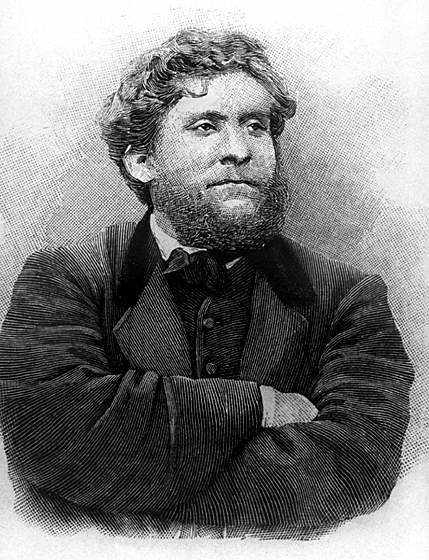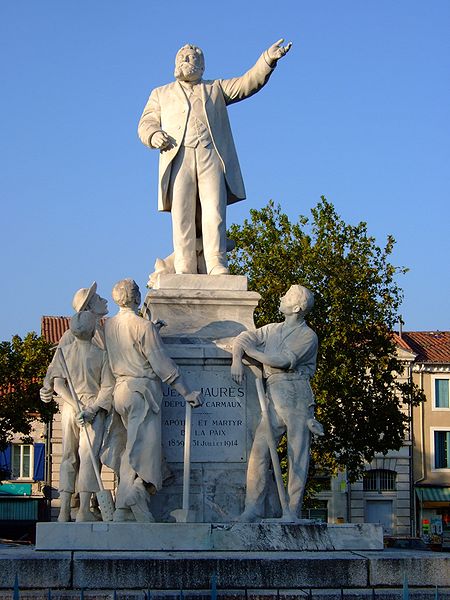<Back to Index>
- Leader of the
French Socialist Party Auguste Marie Joseph Jean
Léon Jaurès, 1859
PAGE SPONSOR
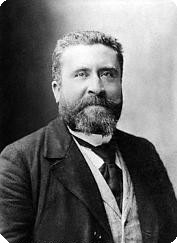
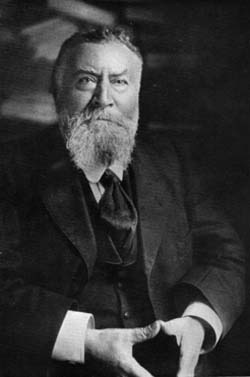
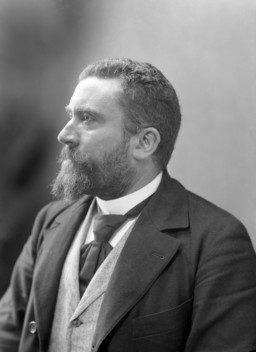
Jean Léon Jaurès (full name Auguste Marie Joseph Jean Léon Jaurès; 3 September 1859 - 31 July 1914) was a French Socialist leader. Initially an Opportunist Republican, he evolved into one of the first social democrats, becoming the leader, in 1902, of the French Socialist Party, which opposed Jules Guesde's revolutionary Socialist Party of France. The two parties merged in 1905 in the French Section of the Workers' International (SFIO). An antimilitarist, Jaurès was assassinated at the outbreak of World War I, and remains one of the main historical figures of the French Left.
The son of an unsuccessful businessman and farmer, Jean Jaurès was born in Castres (Tarn), in a modest French provincial bourgeois family. He was the first cousin once removed of the admiral and senator Benjamin Jaurès, who was named Minister of the Navy and Colonies in 1889, and of the admiral Charles Jaurès. His younger brother, Louis, also became an admiral and a Republican - Socialist deputy.
A brilliant student, Jaurès was educated at the Lycée Louis - le - Grand in Paris and admitted first at the École normale supérieure, in philosophy, in 1878, ahead of Henri Bergson. He obtained his agrégation of philosophy in 1881, ending up third, and then taught philosophy for two years at the lycée of Albi, before lecturing at the University of Toulouse. He was elected Republican deputy for the département of Tarn in 1885, sitting alongside the moderate Opportunist Republicans, opposed both to Georges Clemenceau's Radicals and to the Socialists. He then supported both Jules Ferry and Léon Gambetta.
In 1889, after unsuccessfully contesting Castres, this
time under the banner of Socialism, he returned to his
professional duties at Toulouse, where he took an active
interest in municipal affairs, and helped to found the
medical faculty of the University. He also prepared two
theses for his doctorate in philosophy, De primis
socialismi germanici lineamentis apud Lutherum, Kant,
Fichte et Hegel (1891), and De la réalité du
monde sensible.
Jean Jaurès was initially a moderate republican, opposed to both radicalism (such as that of Georges Clemenceau) and socialism. He developed into a socialist during the late 1880s.
In 1892, Jaurès supported the miners of Carmaux when they went on strike over the dismissal of their leader, Jean Baptiste Calvignac. Jaurès' campaigning forced the government to intervene and require Calvignac's reinstatement. The following year, Jaurès was re-elected to the National Assembly as socialist deputy for Tarn, a seat he retained (apart from the four years 1898 to 1902) until his death.
Defeated in the election of 1898 he spent four years
without a legislative seat. His eloquent speeches
nonetheless made him a force to be reckoned with as an
intellectual champion of Socialism. He edited La Petite République, and was,
along with Emile Zola,
one of the most energetic defenders of Alfred Dreyfus
(during the Dreyfus Affair
that polarized the Right
and Left). He approved
of the inclusion of Alexandre Millerand, the socialist, in
the René Waldeck - Rousseau
cabinet, though this led to a split with the more
revolutionary section led by Jules Guesde.
In 1902 Jaurès was again returned as deputy for Albi. Jaurès and the independent socialists merged in 1902 with Paul Brousse's "possibilist" (reformist) Federation of the Socialist Workers of France and with Jean Allemane's Revolutionary Socialist Workers Party to form the French Socialist Party, of which Jaurès became the leader. They represented a social democratic stance, opposed to Jules Guesde's revolutionary Socialist Party of France.
During the Combes administration his influence secured the coherence of the Radical-Socialist coalition known as the Bloc des gauches, which enacted the 1905 French law on the Separation of the Churches and the State. In 1904, he founded the socialist paper L'Humanité. Following the 1904 Amsterdam Congress of the Second International, the French socialist groups held a Congress at Rouen in March 1905, which resulted in a new consolidation, with the merger of Jaurès's French Socialist Party and Guesde's Socialist Party of France. The new party, headed by Jaurès and Guesde, ceased to co-operate with the Radical groups, and became known as the Parti Socialiste Unifié (PSU, Unified Socialist Party), pledged to advance a collectivist program. All the socialist movements unified the same year in the French Section of the Workers' International (SFIO). In the general elections of 1906, Jaurès was again elected for the Tarn.
His ability was now generally recognized, but the strength of the SFIO still had to reckon with the vigorous radicalism of Georges Clemenceau, who was able to appeal to his countrymen (in a notable speech in the spring of 1906) to rally to a Radical program which had no socialist ideas in view, although Clemenceau was sensitive to the conditions of the working class. Clemenceau's image as a strong and practical Radical leader considerably diminished the popularity of the socialists. Jaurès, in addition to his daily journalistic activity, published Les preuves; Affaire Dreyfus (1900); Action socialiste (1899); Etudes socialistes (1902), and, with other collaborators, Histoire socialiste (1901), etc.
Jaurès traveled to Lisbon and Buenos Aires in 1911. He supported, albeit not without criticisms, the teaching of regional languages, such as Occitan, Basque and Breton, commonly known as "patois", thus opposing, on this issue, traditional Republican jacobinism.
Jaurès was a committed anti
- militarist who tried to use diplomatic means to
prevent what became the First World War. In 1913 he
opposed Émile Driant's law, which implemented a three year
draft period, and tried to promote understanding between
France and Germany. As conflict became imminent, he tried
to organize general strikes in France and Germany in order
to force the governments to back down and negotiate. This
proved difficult, however, as many Frenchmen sought
revenge (revanche) for their country's defeat in
the Franco-Prussian War and the return of the lost Alsace
- Lorraine territory.
On 31 July 1914 Jaurès was assassinated in a Parisian café, Le Croissant, 146 rue Montmartre, by Raoul Villain, a 29 year old French nationalist. Jaurès had been due to attend a conference of the International on 9 August, in an attempt to dissuade the belligerents from going ahead with the war. Villain was tried after World War I and acquitted but was killed by Spanish Republicans in 1936.
Ten years after his death, Jaurès's remains were
transferred to the Panthéon.
